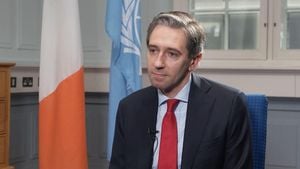Randy Ambrosie has officially stepped down from his position as the Commissioner of the Canadian Football League (CFL), holding his final state-of-the-league address. He had initially announced plans to retire by 2025, but recent developments accelerated this timeline following discussions with CFL governors who signaled diminishing support for his leadership.
First taking the reins on July 5, 2017, Ambrosie succeeded Jeffrey Orridge, becoming the CFL's 14th commissioner. His seven-plus year tenure marks him as one of the longest-serving commissioners, respected for his background as a former player himself—an offensive lineman who had notable stints with the Calgary Stampeders, Toronto Argonauts, and Edmonton Eskimos from 1985 to 1993. Throughout his time, he made significant strides for the league, focusing on financial stability and team ownership matters.
During his final address, Ambrosie shared some candid advice for his successor, emphasizing the importance of surrounding oneself with quality people and maintaining an open mind as they navigate the unforeseen challenges inherent to the role. He stated, "We have really, really good people in place," referring to the current CFL office staff. He urged the next commissioner to trust these individuals who have built up credibility and expertise over the years.
Making headlines during his term, Ambrosie spearheaded illustrated efforts to solidify the ownership situations of troubled franchises like the B.C. Lions, Montreal Alouettes, and Edmonton Elks. Presently, the CFL boasts all nine franchises operating under stable ownership. This progress marks Ambrosie's notable contribution to the league as maintaining secure ownership is pivotal for future prospects.
The CFL experienced a competitive season, with eight out of nine teams finishing with seven or more wins—a clear sign of parity within the league. Attendance at games reached over 1.84 million across the season, translating to an average of 22,764 spectators per game. Notably, attendance figures particularly rose within the league's major markets, such as B.C., Toronto, and Montreal, as well as significant improvements observed via streaming and television ratings.
On the other hand, Ambrosie's departure wasn’t without its struggles. Although he aimed high by projecting he could double the league's revenues, he candidly admitted during his farewell address, "It’s an area where we did underperform." Game-day revenues saw growth of about seven percent this season, but many franchise owners expected more substantial returns, leading to Ambrosie’s diminishing confidence among governors and making his position untenable.
Looking forward, he noted the upcoming expiration of broadcast agreements after the 2026 season as pivotal for the league, expressing optimism about this as the "big lever" for revenue enhancement moving forward. He stated, "You have to build the foundation on which your future is going to rest. You have to build a solid base, I think that's what we've done," pointing to the groundwork he believes is laid for successive successes.
Ambrosie's outlook about league expansion remained decidedly upbeat. He continues to present the notion of adding another team, though he firmly stated his decision against reentering the American market. This preference emphasizes his focus on Canadian cities, where new franchises could potentially flourish.
Summarizing his exit, Ambrosie added, "To me, what I tried to do was be a good learner, take the opportunity with everything new to try and understand it." His sentiment clearly highlights his dedication to growing the CFL, and he leaves behind both accomplishments and unresolved challenges for the next commissioner to tackle.
Ambrosie’s departure resonates with echoes of previous commissioners, each juggling similar pressures and expectations. His goodbye, steeped with appreciation for his dedicated team and the game itself, reminds fans and stakeholders of the fragile yet thrilling nature of professional sports governance.
The league now stands at the brink of new beginnings, poised for both opportunities and hurdles as it searches for Ambrosie's successor to carry on the mission of enhancing the Canadian football narrative poised on solid and stable ground.



